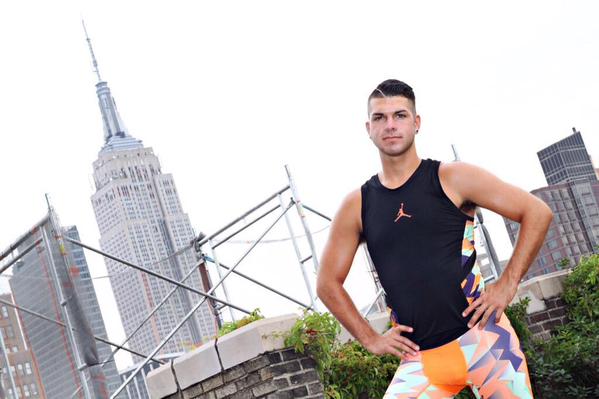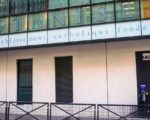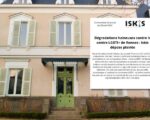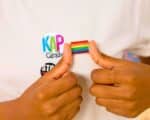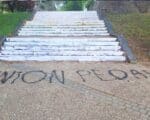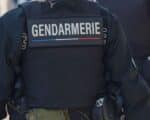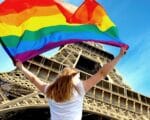>> Gay Kentucky basketball player comes out at a game, gets chased by opposing team
[spacer]
Le combat contre l’homophobie dans le sport américain a toujours lieu d’être. Si au plus haut niveau on a pu voir des progrès depuis le coming out de Jason Collins en mai 2013, avoir une orientation sexuelle différente de celle de ses partenaires peut toujours être problématique pour un joueur de basket. Chez les jeunes en particulier. Dalton Maldonado, un lycéen du Kentucky, ne le sait que trop bien.
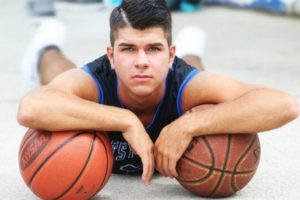 Avoir grandi dans l’un des 6 comtés de l’état où le mariage pour tous n’est pas toléré l’a longtemps dissuadé de se confier à ses coéquipiers de l’équipe de Betsy Laine. Il y a été contraint lorsque le banc d’une équipe adverse, ayant eu vent de la rumeur, s’en est pris à lui pendant un match en le traitant constamment de « pédé ».
Avoir grandi dans l’un des 6 comtés de l’état où le mariage pour tous n’est pas toléré l’a longtemps dissuadé de se confier à ses coéquipiers de l’équipe de Betsy Laine. Il y a été contraint lorsque le banc d’une équipe adverse, ayant eu vent de la rumeur, s’en est pris à lui pendant un match en le traitant constamment de « pédé ».
Dans l’intimité du vestiaire et entre deux sanglots, il a alors révélé à ses camarades ce que certains soupçonnaient déjà. Tous l’ont soutenu et l’ont même physiquement défendu lorsque les mêmes adversaires ont pris en chasse le bus de l’équipe sur plusieurs kilomètres pour en découdre avant d’être dissuadés par l’arrivée des forces de l’ordre. Maldonado avait en effet répliqué aux injures pendant le match en demandant à ses opposants s’ils voulaient son numéro de téléphone pour un rendez-vous galant… De quoi toucher l’orgueil des adolescents décérébrés au point de les inciter à se faire justice eux-mêmes. Choqués par cette scène, les coaches de Betsy Laine avaient fait corps autour du jeune meneur de jeu et la nouvelle, une fois propagée dans tout l’établissement, n’avait déclenché que des retours positifs ou presque de la part des autres élèves.
« L’école a dissimulé ce qu’il s’est passé. Je suis dévasté ».
En haut de la pyramide, en revanche, l’annonce a été moins bien perçue. Si le garçon d’origine porto-ricaine a pu boucler sa dernière année dans l’équipe des Bobcats, encaissant plutôt bien les quelques invectives de certains spectateurs ou adversaires à l’ouverture d’esprit moyenâgeuse, sa fin d’aventure à Betsy Laine peut lui laisser un goût amer. En tant que point guard titulaire et senior, Dalton pouvait s’attendre à figurer dans le fameux yearbook de l’école, à la page de l’équipe de basket. Il y a quelques jours, il a pourtant eu la surprise de voir que tous ses camarades, même ceux qui n’avaient pas disputé la moindre minute en championnat, figuraient dans l’ouvrage sauf lui. Quelques semaines plus tôt, la direction avait décrété qu’il n’y avait eu aucune agression à caractère homophobe de la part du lycée rival de Bryant Station et que Maldonado n’avait subi aucune discrimination malgré les témoignages de plusieurs de ses camarades dans l’équipe.
« Ma famille ne me soutient pas en tant qu’homosexuel et on a eu de nombreuses disputes au sujet de ce que je suis. Ils ne veulent pas que je ramène mon petit ami à la maison par exemple. Cependant, ils ne sont pas les seuls à ne pas avoir accepté mon coming out. A l’école, certains professeurs ont dit des choses et d’autres personnes de la direction ont prétendu que j’avais inventé cette histoire alors que mes coaches leur ont fourni des photos et des messages de l’incident. J’ai appris que l’on avait essayé de dissimuler ce qu’il s’était passé. Aujourd’hui, je tourne les pages du livre de fin d’année et découvre que je ne fais pas partie de l’équipe. Je suis dévasté », a commenté Dalton Maldonado sur Facebook.
L’année prochaine, le jeune homme fréquentera les bancs de l’université de Louisville, qui lui a promis de l’accompagner au mieux dans cette transition. S’il ne jouera vraisemblablement pas avec les Cardinals, l’une des meilleures équipes de NCAA, il pourra vraisemblablement oublier ces moments compliqués auprès de gens, on l’espère, un peu plus évolués.
[spacer]
>> « Hey No. 3, I hear you’re a faggot. »
It was the last thing Dalton Maldonado expected to hear as he and his team lined up to shake hands at a Kentucky high school basketball tournament last December. His Betsy Layne High School team had just gotten thrashed by an opposing team by 32 points. The opposing team was a staple of the state’s top 25 this year; Maldonado and his team just couldn’t hang with them that game. The Betsy Layne starters – including Maldonado – had sat most of the fourth quarter, given the blowout. When the game clock hit zero, tempers were low.
As Maldonado turned to see which of the opposing players called him out, he noticed several people staring at him awaiting a response to the slur. Some of them had suspected Maldonado was gay. Others had heard rumors. Only two teammates had ever heard it from his mouth.
Maldonado shot back with all the wit he could muster.
« Yeah baby, can I have your number? »
It was the perfect response – smart and biting. Maldonado had defused the moment, taking the power out of the player’s slur. « Put up a strong front, » he told himself. « Don’t let them know they hurt you. »
Inside, he was devastated.
Moments later in the locker room, Maldonado broke down. He had struggled with his sexual orientation for years, confiding in just a small group of people including one of his best friends and teammate McKenzie Akers. He had just that week told his parents that he was gay. While they weren’t sure how to take it, they said they still loved him no matter what.
Away from the court with only his team in the locker room, Maldonado slammed his fist against a locker, fell onto a bench and cried.
« I sat back down and realized that I had just came out, and it was definitely not the way I wanted to. Reflecting back to this moment I realize that there was nothing I could do about it. My coach came back in and said, ‘one of our players is in pain, you all need to be there for him.’
« My teammates asked what was wrong, and what he had said to me. McKenzie told them to stop questioning me, but they kept asking and asking. It just built up this pressure in me.
« I finally stood up and said, ‘I’m gay, I’m gay, okay?' »
Maldonado hadn’t wanted to come out while he played sports at all, a byproduct of years of subtle messages about gay men not being capable athletes. Moments after feeling the crush of the gay slur, Maldonado had – in a fit of emotion – come out to his entire team.
« If you weren’t there, it’s hard to describe how emotional Dalton was, » Akers said. « He was crying so hard he was shaking. Like, physically shaking. I felt awful. »
It was about to get worse.
After collecting their clothes and bags the team headed to the bus, where some of the opposing team had assembled. They were yelling at the « faggot, » ordering him to stay out of the bus and face them. When Maldonado boarded, the opposing team proceeded to pound the nearest window of the bus with their fists as they yelled more gay slurs. When a couple opposing players tried to board the bus to get to him, Maldonado’s teammates and coaches forced them back. Once the Betsy Lane team was inside, the bus pulled away.
The opposing team wasn’t done. Several of the players got in their cars and pursued the bus. Whether they actually wanted to assault Maldonado or not, they certainly wanted to scare the hell out of him.
« They were making gestures like they were trying to shoot at the bus, » Akers said. « And they kept yelling bad things at Dalton. It was scary. »
Maldonado’s team called the police and school administrators. They were, unbelievably, in a car chase with another basketball team pursuing them because one of their players was gay. As the bus was chased down the streets of Lexington, the opposing coach stepped in and calmed his team as the police met the Betsy Layne team at their hotel and defused the situation.
The team and Maldonado were safe but shaken.
Yet the problems weren’t over. They were in the middle of a four-day Christmas tournament, and they had games left on the schedule. The hotel was put on « lock down, » with only the Betsy Layne team allowed access to a particular floor. Tournament organizers and school athletic directors were called. The team leaders had known or suspected Maldonado was gay, and they were shaken by the gay slur and ensuing chase that so clearly had an effect on their starting point guard. They still had a couple games left in the tournament, so the question was whether to stay and play the rest of the games or go home.
They would leave it entirely up to Maldonado.
* * *
The story sounds unbelievable, something out of a movie. Yelling gay slurs and trying to attack a player because he’s gay? Getting into your car and chasing down a school bus?
When Maldonado contacted Outsports to share his story we were a bit skeptical. There had to be some embellishment. In 2015 it seemed at least 20 years past the point when something like this was possible.
« It’s all true, » Betsy Layne assistant boys basketball coach Brandon Kidd assured us. Kidd has known Maldonado for many years and played at Betsy Lane a decade ago. Maldonado also sent us photographs of the incident.
« They kept yelling that word, » Akers said, wary of saying « faggot » out loud. « They wanted to get to Dalton. It was intense. »
The name of the opposing school has been left out of the story because the school is on spring break and administrators were not able to answer emails and phone calls to the principal and athletic director.
While it was a soul-shaking experience for the entire team, in the end it was deeply affirming for them. Kentucky is one of the increasingly shrinking number of states where same-sex marriage is illegal. Only a third of the people in Kentucky support marriage equality.
Yet even in rural Kentucky, the Betsy Layne team rallying around Maldonado is becoming more the norm than the actions of a handful of athletes from the Lexington-area opposing high school. The people of Vicco, a Kentucky city of only a few hundred, recently voted an openly gay man as their mayor and passed a non-discrimination ordinance. Morehead, a town of a few thousand, has adopted the same.
« To this day I haven’t lost a friend over coming out, » Maldonado said. « I’ve actually become closer to them. In fact, the one person in my school and on my team I was scared to tell sung the song ‘Same Love’ to me as he told me he would always be here for me and was proud of me.
« It was then that I realized how truly blessed I was. »
While we at Outsports were shocked by the anti-gay behavior of one team, many may be surprised by the support of another. High school is a trying time for many, and acceptance of kids who are « different » can be a struggle. Those outside of Kentucky assume the locale makes it twice as bad. While Maldonado is Puerto Rican, he said he has not experienced any harassment about his ethnicity since he entered high school. Since he’s come out, it’s been all roses.
Despite the public perception of sports as a deeply homophobic institution, sports have long been the ultimate equalizer. Yes, there are still big problems in sports. LGBT people like Michael Sam face powerful discrimination. What we at Outsports have found for years – even in 1999 when we started the Web site – is that when athletes come out to their teams, teammates and coaches rally around them far more often than they reject them. Even in Kentucky.
« He’s one of my players, » Kidd said. « And we treated him just as good as anybody else on the team. I didn’t look at him being a gay player, he was just my starting point guard. »
* * *
After an hour of slurs, car chases and physical threats, Maldonado chose to finish the tournament.
« If we would’ve went home it would’ve looked like I was ashamed of who I am, and I’m not ashamed of who I am. I can stand up for myself, and I had my teammates and coaches by my side. I knew we would be okay. God wouldn’t let anything happen to us. We had come three hours to a tournament and we were finally playing as a team and coming together. »
While some of the younger players – the school is so small that eighth graders play varsity – did choose to go home, the core group of veterans stayed. With one of their teammates under fire, they wanted to make a statement.
For the rest of the tournament, the team had police escorts to and from their hotel and the basketball court. The opposing team was kept well away from Betsy Layne High School. When opposing players tried to do a shoot-around at halftime of a Betsy Layne game, they were quickly removed.
Maldonado’s team, which was ranked as high as No. 17 in the state at one point last season, came together over the episode. They rallied around their gay teammate who had been the victim of the worst explicit hate most of these young student-athletes had ever seen. Instead of rejecting their teammate, finally knowing he was gay bonded the team like never before.
« The other starting four even asked me to move into their room on the trip after this, » Maldonado said. « This brought us closer together, and after this trip I felt more close to them than I felt in my whole life. »
The shift in the team dynamics after the incident was palpable. While Maldonado was the target of the attack, it was the entire team that absorbed the blows.
« After that incident our team really came together, » Kidd said. « Dalton had often hung out with the younger players. After that happened the senior boys really took to him and they accepted him for who he was. It was one of those stories, where they all bonded together. They didn’t look at him as gay or straight, they just looked at him as their brother. »
One particularly meaningful moment came a few games later. Unbeknownst to most of the players, Betsy Layne was playing against another team that happened to feature Maldonado’s ex-boyfriend. During a rough play, Akers knocked the opposing player to the ground. When he helped the player off the floor, Maldonado shot him a dirty look. At the next timeout, Akers asked him about it.
« I don’t want you helping him up, » Maldonado said. Their relationship had not ended well and there was animosity on both sides. « Would you like it if I helped your ex-girlfriend? »
The team got a chuckle out of that. Maldonado loved that they could laugh about it. On top of it all, Maldonado’s team beat his ex-boyfriend in the game.
« That felt amazing. »
Word of the gay basketball player spread like teen gossip so often does. Other schools quickly got wind of the news. During one game in particular, Maldonado heard the opposing band chanting « fag-got fag-got. »
The word simply didn’t affect him like it had weeks before. With his team by his side, he had renewed confidence.
« I felt like I didn’t have anything to hide anymore, and the fact that they accepted me made it all better! »
All of the support has not come without some internal struggle for various players. Growing up in rural Kentucky, in a town of about 7,000 people, two hours from the nearest city of Lexington, the rule of the Bible can be as powerful as the rule of law. Gay people are few and far between, and local doctrine demands a lack of acceptance of homosexuality.
« It’s been hard sometimes, » Akers admits. « But Dalton is my friend. I’ve known him since we were kids. He’s always been there for me when I needed him. Now it’s my turn to be there for him. »
Maldonado has likely played his last game of organized scholastic basketball. He will probably attend Div. 1 Eastern Kentucky University in the autumn. Maldonado, who played varsity basketball in eighth grade and started his final two seasons, is a good player but he’s not that good.
While his basketball shoes will stick to pick-up games, he wanted to share his story now because of what he’s learned. If he knew his coaches and teammates would have his back the way they did, he would have come out years ago.
« It was so much easier playing my senior year because I didn’t have to worry about my parents or teammates finding out because I had already told them. I feel like this can help other young athletes, help them come out. My freshman year I didn’t think I would ever come out.
« Now here I am telling the world. «


